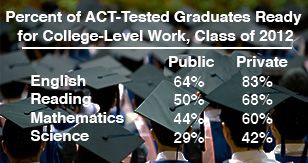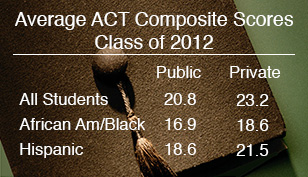If you graduated from a private high school this past June, you were significantly more likely than graduates of other schools to be ready for college coursework, according to data compiled by ACT, the college admission testing company.

Eighty-three percent of 2012 graduates of religious and independent schools who took the ACT met or surpassed the test’s college readiness benchmark score in English, compared to 64 percent of graduates from public schools. The share of students who met the benchmark scores in other subjects was also higher in private schools (reading – 68 percent vs. 50 percent; math – 60 vs. 44; science – 42 vs. 29).
According to the ACT, college readiness benchmarks “are the minimum scores needed on the ACT subject area tests to indicate a 50 percent chance of obtaining a B or higher or about a 75 percent chance of obtaining a C or higher in corresponding credit-bearing first-year college courses.”
The ACT today released a report titled The Condition of College & Career Readiness 2012, which summarizes the national performance of ACT-tested students. At CAPE’s request, the company compiled comparable data for private school graduates.

ACT Scores Higher
Average actual ACT scores for 2012 graduates of private schools were significantly above the national average. The ACT mean composite score for 2012 private school graduates was 23.2, compared to 20.8 for public school graduates, and the private school advantage remained steady across all subject areas: English – 23.5 vs. 20.1, reading – 23.5 vs. 21.0, math – 22.8 vs. 20.9, and science – 22.5 vs. 20.7.
The ACT scoring scale ranges from 1 to 36, and seemingly small differences in the scale score can represent significant percentile shifts. For example, an ACT English score of 20 has a national percentile rank of 50 among all ACT-tested students in the class of 2012, meaning that 50 percent of graduates who took the ACT English test scored a 20 or below. But an English scale score of 24 places a student at the 74th percentile. In other words, a four-point scale difference on the English test represents, at least in this example, a 24-point percentile difference.
